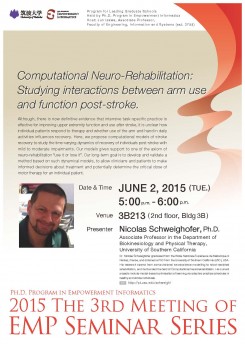2015年6月2日(火)17:00 – 18:00:3B213:2015 The 3rd meeting of EMP Seminar Series University of Southern California Nicolas Schweighofer先生講演会のご案内
2015 The 3rd meeting of EMP Seminar Series
University of Southern California Nicolas Schweighofer先生講演会のご案内
University of Southern California、Department of Biokinesiology and Physical Therapy、Associate Professor、Nicolas Schweighofer先生に、2015 EMP Seminar Seriesにてご講演いただくことになりました。貴重な機会となりますので、皆様奮ってご参加ください。
日時:平成27年6月2日(火) 17:00~18:00
場所:筑波大学 第3エリア 3B213(地図)
言語:英語
世話人:井澤 淳 准教授(システム情報系)
University of Southern California、Department of Biokinesiology and Physical Therapy、Associate Professor、Nicolas Schweighofer 先生
Dr. Nicolas Schweighofer graduated from the Ecole Nationale Supérieure de Mécanique in Nantes, France, and obtained a PhD from the University of Southern California (USC), USA. His research spams from computational neuroscience modelling to robot-assisted rehabilitation, and he founded the field of Computational Neurorehabilitation. His current projects include model-based optimisation of learning via adaptive practice schedules in healthy and stroke individuals.
演題:Computational Neuro-Rehabilitation: Studying interactions between arm use and function post-stroke.
概要:Although, there is now definitive evidence that intensive task-specific practice is effective for improving upper extremity function and use after stroke, it is unclear how individual patients respond to therapy and whether use of the arm and hand in daily activities influences recovery. Here, we propose computational models of stroke recovery to study the time-varying dynamics of recovery of individuals post-stroke with mild to moderate impairments. Our models gives support to one of the axiom of neuro-rehabilitation “use it or lose it”. Our long-term goal is to develop and validate a method based on such dynamical models, to allow clinicians and patients to make informed decisions about treatment and potentially determine the critical dose of motor therapy for an individual patient.



